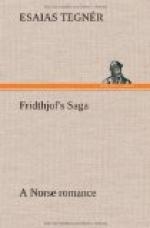GEFJUN. The goddess of maids. Geirs-odd
(spear-death). Death by the spear, self-inflicted.
See Valhal. GERD. Frey’s wife, and
very beautiful. Gimle. The heaven of
heavens, where dwell the righteous after Ragnarok.
Gjallarhorn. The horn of Heimdal, the Saint
Peter of the old mythology. It was heard all
over the world. Glitner (the glittering).
Forsete’s golden dwelling. Groning-sound.
A sound between the Danish Islands. Gudbrand’s
dale. Canto XIV, p. 138. in the diocese of
Aggerhus, celebrated afterward (1612) for a battle
in which the Norwegians slaughtered the forces of
Col. St. Clair, the Scotch ally of Christian IV,
of Denmark. Hagbart. the sea-king,
who became secretly betrothed to Signe, of Princess,
thereby gaining the enmity of her father, who captured
and hung him. Signe, unwilling to survive her
betrothed, set fire to her dwelling and was burned
to death.—See Cantos XVI and XVII.
Hagring. Fata morgana. Ha’vama’l.
The high song of Odin, containing many wise precepts
for the government of men. Hel. The
goddess of death. HILDER. The goddess of
war. Hoder. The blind god; brother
of Balder. Tempted by Loke, he slew Balder with
the mistletoe. Ida’s plain.
Where the gods assemble after Ragnarok. Idun.
Wife of Brage. She is the rejuvenating goddess,
the “ever-renovating spring,” and hence
she is dressed in green. —See Canto I, p.
5. She keeps the apples of immortality.
Jotunheim. The abode of the Giants.
Loke. The evil one. “He is the
sly treacherous father of lies. In appearance
he is beautiful and fair, but in his mind he is evil,
and in his inclinations he is inconstant. Notwithstanding
his being ranked among the gods, he is the slanderer
of the gods, the grand contriver of deceit and fraud,
the reproach of gods and men. Nobody renders
him divine honors. He surpasses all mortals in
the arts of perfidy and craft.” -See Norse
mythology, page 373. Midgard.
The earth; the abode of man. Midgard-serpent.
A child of Loke. It was cast into the sea by Odin,
and it grew till it reached around the whole world.
Mimer. The wise giant keeper of the holy
well of wisdom. Morven’s hills.
Hills in the north of Scotland. Muspelheim.
The abode of fire. Muspel’s sons.
Flames. Nanna. Balder’s wife;
goddess of flowers. She died heartbroken at Balder’s
death. Nastrand (the shore of corpses).
Where the wicked are punished after Ragnarok.
Nidhug. The dragon which lives in the fountain
Hvergelmar and gnaws the root of Ygdrasil. Niflheim.
The world of mists; the lower world; the place of punishment.
Norns. The Fates. They are three:
Urd, the past; Verdande, the present, and Skuld, the
future. They control the destinies of gods and
men. Oder. Freyja’s husband.




